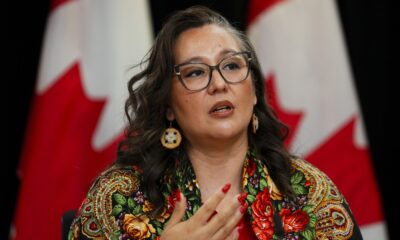Health
B.C. Maternity Crisis: Women Face Challenges Giving Birth

As expectant mothers in British Columbia grapple with a shortage of maternity specialists, the situation has become increasingly dire, particularly for women who must travel far from home to give birth. Brittany King, 36 weeks pregnant, finds herself in a hotel in Prince George, 600 kilometres away from her community in Kitimat. This move is necessary as her local hospital lacks the capability to support her twin pregnancy, which will require a C-section later this month.
King’s experience reflects a broader crisis affecting maternal health services in the province. In a statement released on October 6, 2023, the obstetrics and gynecologists section of Doctors of B.C. highlighted the alarming shortage of specialists. They noted that such shortages put the lives of mothers and babies at risk, particularly during critical moments when decisions must be made swiftly by medical professionals.
The situation is particularly acute in Prince George and Kamloops, where hospitals have informed patients of the potential need to transfer them to other facilities for delivery. While Northern Health confirmed that they have secured specialist coverage for the Prince George hospital during August and September, the status in Kamloops remains uncertain. According to Dr. Peter Bosma, executive medical director for Interior Health, patients without local maternity care may still face transfers, though doctors have managed to cover existing gaps.
“Patients are encouraged to present to Royal Inland Hospital when seeking urgent care, where they will receive an assessment and a care plan,” Dr. Bosma said. He added that family practitioners with advanced obstetrical skills would be available to assist with deliveries when feasible.
The shortage of maternity specialists has not only impacted acute maternity care but has also resulted in limited access and long waitlists for women of all ages seeking specialist consultations. The ongoing closures of maternity services stem from physicians in these communities being overwhelmed by competing health priorities, according to the Doctors of B.C. statement.
Years of overwork have led to burnout among healthcare professionals, driving many to leave the field. As the statement points out, the situation requires urgent attention from the provincial government.
Dr. Douglas Waterman, a gynecologist based in New Westminster, emphasized the need for the Ministry of Health to address the root causes of the shortage. “Over the past two to three decades, providing obstetrical care has become more complex,” he stated. Factors such as women opting to have children later in life and the increased likelihood of medical complications in first-time pregnancies demand greater involvement from obstetricians.
During discussions with government officials, there was recognition that the current reimbursement model is inadequate. Dr. Waterman noted the need for alternative payment structures that could alleviate the burden on healthcare providers. “If we continue to recruit new physicians into a dysfunctional system, they will face the same issues of burnout and job dissatisfaction,” he warned.
Despite the challenges, Canada boasts one of the best perinatal outcomes globally, a success attributed to a well-organized healthcare system. “Our mothers and their babies deserve a sustainable system that meets their needs,” Dr. Waterman asserted.
In response to the crisis, the B.C. Ministry of Health stated that health authorities are taking measures to fill provider gaps and ensure patients receive necessary care. The ministry is actively working on recruiting doctors from the U.S. and other countries, aiming to streamline the process for credential recognition.
Nicole Penner, who is expecting her fourth child soon, expressed her anxiety over where to give birth. Her midwife indicated that she might need to travel to Quesnel or Vanderhoof, both over an hour away. After Northern Health’s announcement about securing specialist coverage, Penner remained confused about her options. “I’m scared. Do I call the hospital or start driving to Vanderhoof? When you’re in labour, you can’t think. It’s the only thing on your mind,” she shared.
For Brittany King, the uncertainty regarding childbirth, whether in Prince George or elsewhere, continues to loom large. With her family launching a GoFundMe campaign to assist with expenses, she candidly expressed her frustration, saying, “It sucks. What else can I say?”
As the demand for maternity care increases, it is clear that addressing the staffing shortages and improving the healthcare system is essential for the well-being of mothers and their babies across British Columbia.
-

 Politics4 weeks ago
Politics4 weeks agoSecwepemc First Nation Seeks Aboriginal Title Over Kamloops Area
-

 World5 months ago
World5 months agoScientists Unearth Ancient Antarctic Ice to Unlock Climate Secrets
-

 Entertainment5 months ago
Entertainment5 months agoTrump and McCormick to Announce $70 Billion Energy Investments
-

 Science5 months ago
Science5 months agoFour Astronauts Return to Earth After International Space Station Mission
-

 Lifestyle5 months ago
Lifestyle5 months agoTransLink Launches Food Truck Program to Boost Revenue in Vancouver
-

 Technology3 months ago
Technology3 months agoApple Notes Enhances Functionality with Markdown Support in macOS 26
-

 Lifestyle3 months ago
Lifestyle3 months agoManitoba’s Burger Champion Shines Again Amid Dining Innovations
-

 Top Stories2 months ago
Top Stories2 months agoUrgent Update: Fatal Crash on Highway 99 Claims Life of Pitt Meadows Man
-

 Politics4 months ago
Politics4 months agoUkrainian Tennis Star Elina Svitolina Faces Death Threats Online
-

 Sports5 months ago
Sports5 months agoSearch Underway for Missing Hunter Amid Hokkaido Bear Emergency
-

 Politics5 months ago
Politics5 months agoCarney Engages First Nations Leaders at Development Law Summit
-

 Technology5 months ago
Technology5 months agoFrosthaven Launches Early Access on July 31, 2025



















